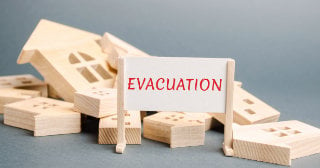In less than 9 years, ransomware attacks are predicted to attack and encrypt businesses or devices...
Is Your Home-Based Business Covered? Personal vs. Business Insurance
Running a business from the comfort of your home offers many benefits—flexibility, convenience, and cost savings among them. However, many home-based business owners overlook one critical aspect: insurance. While you may assume that your homeowners’ or renters’ insurance provides all the protection you need, the reality is that most personal insurance policies have significant limitations when it comes to business activities.
The Limits of Personal Insurance
Your homeowners’ or renters’ insurance policy is designed to protect your home and personal belongings, but it’s not built to cover business operations. Here are a few key areas where your personal insurance may fall short:
- Business Property:
If your home-based business requires equipment, such as computers, printers, inventory, or specialized tools, these items may not be fully covered under your homeowners’ policy. Many policies have low limits on coverage for business property—often just a few thousand dollars. If your equipment is damaged, lost, or stolen, you could be left paying out of pocket for replacements. - Liability Coverage:
Personal liability coverage under a homeowners’ or renters’ policy is designed to protect you from claims arising from personal activities, such as a guest being injured on your property. However, if a client is injured while visiting your home office, your policy may not cover the claim, leaving you vulnerable to costly lawsuits. - Business Interruption:
If a covered peril, such as a fire or storm, makes your home uninhabitable, your homeowners’ policy might cover the cost of temporary housing but won’t cover the loss of income or extra expenses incurred while your business is disrupted. Business interruption coverage, which is typically part of a business insurance policy, can help cover these costs.
Understanding Your Business Insurance Needs
Given the limitations of personal insurance, it’s crucial to assess whether your home-based business requires separate or additional coverage. Here are a few options to consider:
- Home-Based Business Endorsement:
Some insurers offer an endorsement or rider that can be added to your existing homeowners’ policy to provide additional coverage for business property and limited liability protection. This option is typically best for small, low-risk businesses with minimal equipment and client interaction. - In-Home Business Policy:
This type of policy is specifically designed for home-based businesses and offers broader protection than a simple endorsement. It typically includes coverage for business property, liability, and even loss of income due to a covered event. An in-home business policy is a good option for businesses with more substantial assets or those that regularly host clients or customers at home. - Business Owners Policy (BOP):
If your home-based business has significant assets, employees, or generates substantial revenue, a Business Owners Policy (BOP) might be the best choice. A BOP combines general liability, property insurance, and business interruption coverage into one comprehensive package, offering more robust protection than a basic in-home business policy. - Professional Liability Insurance:
Depending on the nature of your business, you may need additional coverage like professional liability insurance, also known as errors and omissions (E&O) insurance. This is particularly important for businesses that provide advice or services, such as consulting, coaching, or freelance work, where clients could hold you liable for mistakes or negligence.
Why Separate Business Insurance is Essential
Not having the right insurance coverage for your home-based business can lead to significant financial loss if something goes wrong. Here are some scenarios that highlight the importance of separate business insurance:
- Property Damage: Imagine your home office is damaged in a fire. Without adequate business property coverage, replacing expensive equipment and inventory could drain your savings.
- Liability Claims: If a client slips and falls while visiting your home office, you could face a costly lawsuit. Without proper liability coverage, legal fees and settlement costs could put your personal assets at risk.
- Business Interruption: A storm damages your roof, forcing you to temporarily close your business. Without business interruption coverage, the loss of income and extra expenses for temporary relocation could severely impact your finances.
Steps to Ensure Adequate Coverage
To protect your home-based business, follow these steps:
- Assess Your Risks: Identify the specific risks your business faces, such as the value of your equipment, the nature of your work, and whether you have clients visiting your home.
- Review Your Current Policy: Speak with one of our knowledgeable insurance professionals to understand what coverage your homeowners’ or renters’ policy provides for business activities and where it falls short.
- Explore Business Insurance Options: Consider the different types of business insurance policies available and choose one that meets your needs. This may involve adding endorsements to your current policy or purchasing a separate business insurance policy.
- Update Your Coverage Regularly: As your business grows and evolves, so do your insurance needs. Regularly review and update your coverage to ensure it keeps pace with your business.
Running a business from home offers many rewards, but it also comes with unique risks that personal insurance policies may not cover. Understanding the limitations of your homeowners’ or renters’ insurance and securing the right business coverage is essential to protecting your livelihood. Don’t wait until it’s too late—review your insurance needs today to ensure your home-based business is fully protected.



-1.jpeg?height=200&name=business-technology-and-people-concept-senior-b-2021-08-26-17-31-01-utc%20(1)-1.jpeg)

-1.jpeg?height=200&name=ransom-ware-cyber-attack-warning-message-on-a-co-2022-12-16-12-17-18-utc%20(1)-1.jpeg)